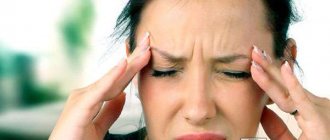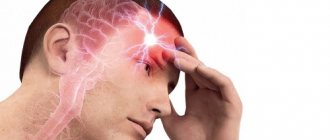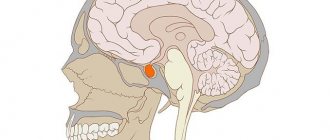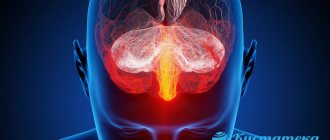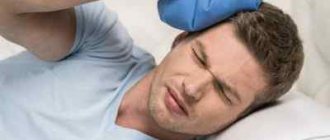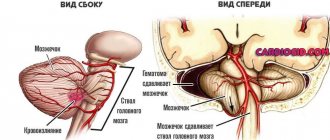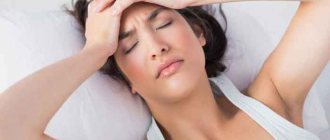Dizziness due to neuroses, the symptoms of which can be different, is one of the most common problems. They can indicate many diseases, including problems with blood vessels and heart, migraine, hypertension or hypotension, etc. However, not in last place is such a disorder as neurosis.
Neurosis is a psychogenic disease accompanied by disturbances in the functioning of the central nervous system. As a rule, it occurs as a result of a person having any psychological trauma, internal conflicts or long-term stress. This disease tends to be long-lasting and difficult to treat.
Almost all types of neuroses are accompanied by autonomic disorders. Therefore, changes in the activity of the vestibular apparatus occur quite often. Hence the presence of dizziness.
What are the reasons?
There are a number of reasons that cause imbalance (dizziness) accompanied by headaches. As a rule, they are caused by dysfunction in a separate vestibular system.
Also, if you have pain and dizziness, the reasons include visual impairment, inability to coordinate the body in space, or a combination of both factors. In addition, these symptoms cause some diseases such as high blood pressure, heart rhythm disturbances. Dizziness itself is divided into 2 types:
- Peripheral. Caused by a disorder at the level of the inner ear and the nerve that sends signals to the brain. It affects people of all ages. This condition is easily diagnosed and treated.
- Central. Caused by damage to the brain area. It also happens to people of all ages.
Reasons for headaches and dizziness include disorders such as:
- specific form of migraine;
- multiple sclerosis;
- vascular malformations;
- tumors, etc.
In older people, the vascular cause of balance disorders and headaches is primarily considered.
Migraine
This is a disease caused by many factors. They cannot be accurately distinguished from each other because they may overlap. Severe pain is felt in the temple, less often - on the top of the head. May be present:
- nausea;
- visual disturbances;
- temperature increase.
Interestingly, many women experience migraine relief during pregnancy.
A common reason why migraines cause constant pain and dizziness is the vertebrogenic component. As a rule, after eliminating functional disorders of the spine, attacks weaken or disappear completely.
Hormones
Sometimes dizziness and headache bother women due to the menstrual cycle. They can occur a week before or during menstruation, accompanied by abdominal discomfort and mood swings. Transient conditions are associated with hormonal imbalances and are not a cause for concern. Long-lasting unpleasant symptoms require consultation with a doctor.
Cervical spine
The close connection between the cervical spine, dizziness and headaches is manifested by symptoms that occur immediately after waking up or during night vigils. Most often, pain is felt in the back of the head and is associated with muscle stiffness. These morning problems are most often caused by poor head and neck position while sleeping.
Dizziness and headache when bending over
The symptoms are felt most clearly when bending over for a long time. This condition is common in school-age children. Usually it begins after the 2nd lesson, leading to decreased attention and loss of concentration. In such cases, it is recommended to wear a support collar.
Injury
Almost all sudden falls are accompanied by a sudden movement of the head and neck. As a result, functional joint blockages may occur and existing defects may worsen. A classic example is a concussion. With minor injuries, headaches and dizziness typically occur only after 1-2 days.
Arterial hypertension
In a patient suffering from arterial hypertension, stress, anxiety, and a tense nervous state cause a sharp increase in blood pressure. This is partly due to the release of cortisol and adrenaline, which leads to vasoconstriction.
The cause of dizziness and pain in the back of the head can be primary (essential) hypertension, a disease associated with increased blood pressure. Stress only aggravates the situation, making the patient dizzy to the point of nausea.
Observations of patients and studies of arterial hypertension have led to the conclusion that primary hypertension, that is, arising not as a consequence of other diseases, but on its own, occurs three times more often in the group of patients who constantly live in tension.
Is the patient able to help himself in the fight against stress and its consequences, including high blood pressure, dizziness, and spots before the eyes? To do this you need:
- find time to meet with friends;
- regulate your diet, giving preference to low-fat protein products (poultry, sea and river fish), fruits and vegetables;
- learn to say “no” when they try to burden you with extra work or obligations;
- give up alcohol and smoking. These bad habits do not solve the problem, and cause significant harm to health.
Moderate intensity physical activity (cardio training) will also serve as a preventive measure in the fight against high blood pressure.
Dizziness and headache after exercise
After a workout, a person usually feels slightly weak and tired. But there are other sensations that are not usually considered normal. Should these signs be cause for concern?
Dizziness
When training at higher intensity, the blood vessels in the muscles dilate, pulse and blood pressure increase. After a sudden stop, blood pressure and heart rate drop sharply, but the blood vessels remain dilated longer. This causes blood deficiency in the upper body. A person may experience dark vision, dizziness and headaches, and blocked ears. Rarely, clouding and even loss of consciousness are possible. The condition is not dangerous. As a rule, it passes quickly.
Headache
Headaches after or during exercise are not completely normal. Especially in hot weather, they can be caused by a large loss of minerals and dehydration. It is important to drink enough fluids to prevent discomfort.
The cause may be low blood sugar. Therefore, it is important not to train on an empty stomach, but to quickly replenish carbohydrates after finishing physical activity.
Poor sports technique causes severe pain and dizziness due to increased tension in the neck muscles. Sometimes the cause is the processes leading to migraine, i.e. increased blood flow through the cerebral vessels.
Consequences of dizziness and headaches
Dizziness is an unpleasant symptom that ranges from simple unsteadiness when walking to a floating sensation or a tendency to fall. Sometimes other symptoms appear at the same time that cause discomfort. In particular, a person may feel nauseous. Some people who experience severe dizziness may over time develop a phobia (fear) in certain situations (they are afraid of walking on a narrow bridge, being in the open air, being at heights, etc.).
Headache may be an accompanying manifestation of the disease. This especially applies to conditions in which fever occurs and the body aches. While aches and fever (often accompanied by a sore throat) are signs of a cold or flu, they can also accompany a more serious inflammatory process in the body. If these symptoms are ignored, the disease can cause significant harm to health.
Identifying the cause is the basis for successful treatment
There are many diseases that cause pain and dizziness. The doctor determines what to do to alleviate a person’s condition based on the diagnostic results. Its goal is to identify the primary disease. The basis is taking an anamnesis and considering the signs. Blood pressure and ECG are measured. These methods help determine the presence of circulatory problems, heart disorders, etc. In the absence of accurate results, additional examinations are carried out, incl. psychological tests.
Treatment
The first step in treatment is eliminating the primary disease. If this is not possible or there is no improvement (for example, with arteriosclerosis), only the symptoms are treated. The doctor prescribes medications to relieve pain (Paracetamol tablets or capsules, Analgin, etc.), calm the vestibular system (sedative antihistamines - substances that block histamine receptors, improve blood flow to the inner ear, and have a calming effect).
Diazepam (injections), which reduces irritability of the vestibular apparatus, is suitable for relieving severe dizziness.
The brain is an adaptable organ; After some time, he may become accustomed to the changes caused by the drugs and begin to process signals in an abnormal way. Therefore, treatment is limited in time.
Herbal remedies
Ginger can be used as an aid for dizziness and headaches. It is used in powder or capsule form. Herbal medicines that improve blood flow also include extracts of ginkgo biloba, garlic. To improve blood circulation in atherosclerosis, mistletoe preparations are recommended.
Exercises for cervical spine disorders
Men and women suffering from cervical spine blockage are advised to sleep in the correct position and do the following exercises.
Starting position:
- Sit on a chair.
- Straighten your spine.
- Relax your shoulders.
- Maintain a right angle between your chin and neck.
Before each exercise, slightly stretch your neck, pulling your head up.
Exercise #1:
- Slowly turn your head to the right, back to the center, slowly to the left.
- Close your eyes and watch the smooth, slow movements.
Exercise #2:
- Tilt your head left and right (do not make a wide range of movements).
- Keep your shoulders relaxed.
Exercise #3:
- Make a figure eight in the air with your nose (small range of motion).
- Try to maintain approximately a right angle between your chin and neck.
Treatment and prevention
First of all, of course, you should get rid of the neurosis itself, which has become the main cause of dizziness. Depending on its severity, treatment can either be successfully completed within a few months or drag on for many years. In this case, psychotherapy will help, which gives very significant results.
In addition, it is recommended to perform balance exercises or so-called vestibular gymnastics. This will help to significantly improve the functioning of the vestibular apparatus and reduce its excitability.
Breathing exercises won't hurt either. Sometimes it is carried out as part of psychotherapy, but this rarely happens, so you can and should do it yourself. Gymnastics consists of training abdominal breathing and increasing the duration of exhalation. This has a calming effect on the nervous system.
Sometimes your doctor may prescribe medications. True, such treatment has many side effects. It is used in the most advanced cases.
As for prevention, experts advise leading an active lifestyle, including regular physical activity in your schedule and consuming more plant-based foods.
Conclusion
A person suffering from frequent dizziness and headaches sometimes wonders whether there is a serious health problem? The probability of confirmation of suspicion is small. But if suddenly the type of pain and its location change significantly, it is better to consult a doctor.
To eliminate dizziness and headaches, a constant search and interpretation of the causes of these symptoms is necessary. As a rule, it is recommended to adjust your diet: reduce the consumption of alcohol, caffeine, black tea, and salt. Adequate quality sleep, staying in the fresh air, and avoiding stressful situations are also important. For older people in particular, it is advisable to avoid all activities that could cause a fall.
Causes of instability and unsteadiness of gait during VSD
Patients usually describe unsteadiness and instability during gait in different ways.
For some, this symptom is only mild dizziness, for others it is a noticeable stagger when walking. And still others cannot clearly explain what they mean when they talk about their condition and call it “a feeling of instability in the head.”
However, such a manifestation is always unpleasant for patients; in some cases, not understanding what triggered it can cause people to become very fearful for their health.
How does the feeling of unsteadiness and instability manifest when walking?
The following signs may accompany the symptom:
- impaired coordination;
- dizziness;
- feeling as if “the ground is moving away from under your feet” when standing or walking;
- frequent trips or falls;
- weakness in the legs (“cotton” legs);
- unnatural gait;
- difficulty moving up stairs;
- sways from side to side when walking;
- difficulty moving the legs after a long rest;
- Preferred support on the heels when walking.
Feeling unsteady can indicate the presence of many diseases. These may be osteochondrosis, atherosclerosis, traumatic brain injuries, arthritis, central nervous system diseases, foot deformities, etc. If a patient experiences a strong feeling of unsteadiness when walking, he is usually prescribed certain diagnostic methods.
- Studying the patient's steps with eyes open and closed.
- Examination of gait when moving to the side, as well as when moving backwards.
- Detection of changes when moving around an object (for example, a chair).
- Studying heel and toe steps, body turns, slow and fast steps.
- Observing the patient's gait on the stairs.
Consultations with various specialists (endocrinologist, otolaryngologist, neurologist) may also be prescribed and CT, MRI and other studies may be performed.
Psychological causes of gait unsteadiness and instability
Often, the feeling of unsteadiness when walking is provoked by such reasons as VSD, long-term depression, stress, neuroses, intense anxiety and uncontrollable fears. It is known that psycho-emotional stress can cause many unpleasant and even painful symptoms that have a negative impact on the patient’s condition as a whole. Among them:
As a rule, with VSD, due to high anxiety, the patient often experiences jumps in blood pressure, which can lead not only to darkening of the eyes, the appearance of spots, blurred vision, dizziness and tinnitus, but also to a feeling of instability and unsteadiness when standing or walking .
With intense anxiety, which is a constant companion of VSD and phobias, various respiratory disorders often appear (suffocation, a feeling of incomplete inhalation or exhalation, shortness of breath, weakness in the legs, a feeling of derealization), which can also affect the emergence of feelings of instability and uncertainty.
People have this expression: “the ground disappears from under your feet.”
That is, if a person is under severe stress, he may experience a loss of support and thus a loss of stability, balance and self-confidence.
Well, people with an anxiety disorder such as VSD are constantly under such stress. Therefore, it is not surprising that they experience dizziness and staggering when walking.
Treatment of unsteadiness and unsteadiness when walking
Treatment of a patient suffering from a feeling of instability, as a rule, begins with identifying the causes that provoked the occurrence of the symptom. So, depending on what caused the illness, the patient may be prescribed various vitamin complexes, special diets, antibiotics (for infectious diseases), painkillers or sedatives.
If dizziness and unsteadiness are caused by stress, then psychotherapeutic treatment is indicated to solve the problem, i.e. work with a psychologist aimed at restoring the psychological state.
In severe cases, in addition to this work, medication (tranquilizers, antipsychotics, nootropics, antidepressants) is required to normalize the condition.
Milder sedatives, such as Valerian or Motherwort, are often prescribed.
For preventive purposes, in case of an unstable nervous system, the patient is recommended to avoid getting into stressful situations if possible, engage in physical exercise, take active walks in the fresh air and try to get as many positive emotions as possible. Sometimes just a change in lifestyle can significantly reduce the excessive susceptibility of the psyche to “nervous” situations.
For any type of instability and staggering, it is recommended to consult a specialist for the necessary examination. Regardless of the cause, if the patient feels unsteady, proper rest and a balanced diet with all the necessary vitamins and microelements are also recommended.
Source: https://vsdshnik.com/oshhushhenie-neustoychivosti.html


